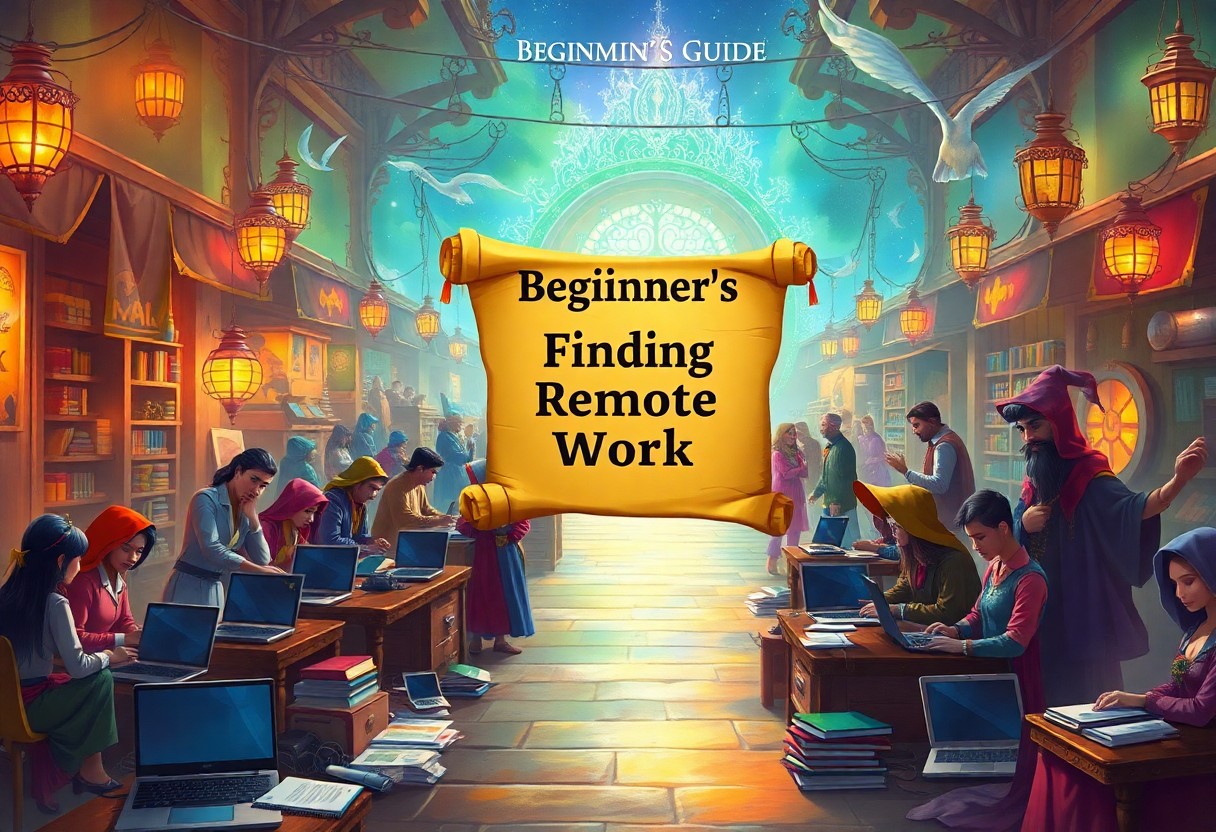There’s a growing demand for remote work opportunities, even for those of us without formal experience. In this guide, I will share effective strategies to help you identify entry-level remote positions and stand out as a candidate. You’ll learn how to leverage your skills, create a compelling resume, and utilize online job platforms to get noticed. With the right approach and a little persistence, you can secure your first remote job and start your journey towards a flexible, rewarding career.
Key Takeaways:
- Focus on transferable skills from previous experiences or education.
- Utilize online platforms and networks specifically tailored for remote job listings.
- Customize applications to highlight your adaptability and willingness to learn.

Understanding Remote Work
To thrive in remote work, it’s imperative to grasp its defining characteristics. Remote work allows you to perform your job from virtually anywhere, relying heavily on technology for communication and collaboration. As someone new to this environment, you might find opportunities that cater specifically to your skills or interests. For an updated guide, refer to How to Get a Remote Job with No Experience (2025 Edition).
What is Remote Work?
Remote work encompasses jobs that can be performed outside of a traditional office setting, leveraging digital tools for task completion. Employees engage with their teams through platforms like Zoom, Slack, and project management software, often working from home or different locations globally. This flexibility has grown in popularity, making it a viable option for many people.
Advantages of Remote Work
Choosing remote work offers several advantages, including increased flexibility in managing your schedule and a better work-life balance. You can save time and money on commuting, creating an opportunity to focus on productivity. Additionally, the vast array of global job options allows you to find positions that align with your interests rather than being confined to your immediate geographic area.
With remote work, you gain access to a broader job market, connecting with companies around the world that value diverse skill sets. The potential for higher earnings is significant, as some remote roles offer salaries that rival traditional positions without the associated costs of commuting or relocation. Flexibility also means you can tailor your work environment, whether it’s a quiet home office or a café, ultimately enhancing your productivity and job satisfaction.
Identifying Your Skills and Strengths
Understanding your unique skills and strengths is the first step toward finding remote work, especially without prior experience. This involves introspection, assessing what you excel at, and evaluating how these abilities can translate into a remote job setting. Recognizing both hard and soft skills will empower you to position yourself effectively and identify roles that suit you best.
Assessing Transferable Skills
Transferable skills, such as communication, problem-solving, and adaptability, play a significant role in securing remote jobs. I find many of these skills come from previous experiences, such as volunteer work or part-time jobs; they can be carried over to different fields. Identifying these abilities allows you to showcase how your past experiences can be beneficial in a new setting.
Highlighting Relevant Strengths
Focus on strengths that align with remote work demands, like self-discipline and time management. Employers value these traits because remote work requires individuals to be proactive and organized. Highlight any experience that demonstrates your ability to work independently, such as managing projects or meeting deadlines without direct supervision. For instance, I’ve successfully completed online courses on my own schedule, showcasing my commitment and ability to manage my time effectively.
Emphasizing strengths relevant to remote work can significantly enhance your employability. I found that illustrating instances where my independent initiatives led to successful outcomes resonated with potential employers. For example, coordinating online events or managing a social media account independently demonstrated my capacity to handle responsibility and communicate effectively in a remote environment. Collect specific examples from your background that affirm these strengths, ensuring you craft a compelling narrative that aligns with the needs of remote positions.
Finding Remote Job Opportunities
Exploring where to find remote job opportunities can open many doors for you. A variety of job boards focus exclusively on remote work, like We Work Remotely, Remote.co, and FlexJobs. Networking through platforms like LinkedIn or engaging in remote work forums and communities enhances visibility. Many companies list remote positions on their own careers pages, making it vital to research organizations that align with your interests. By leveraging multiple sources, you increase your chances of discovering suitable remote roles.
Where to Search for Remote Jobs
Job boards specific to remote work yield the best results. Sites like Remote OK and Jobspresso curate listings from various industries, offering tailored filters to match your skills. I often find that niche job boards targeting specific sectors, like Tech Remote for tech roles, can present unique opportunities. Don’t overlook traditional platforms like Indeed or Glassdoor, as they now include remote job filters, broadening your search. Keep an open mind as you navigate these platforms.
Creating Job Alerts
Setting up job alerts can significantly streamline your job search. By entering specific keywords related to your desired roles and setting geographical parameters to include “remote,” you can receive notifications directly to your inbox. This feature saves time, allowing you to focus on applying rather than constantly searching for new listings. I suggest using platforms like LinkedIn and Google Jobs, which offer customizable alerts to ensure you never miss an opportunity.
Creating job alerts increases the efficiency of your search by delivering relevant job listings directly to you. For instance, after setting keywords like “entry-level marketing remote,” I received daily updates tailored to my preferences. Many sites allow you to specify additional filters, such as job type or company size, giving you refined results that suit your needs. Utilize this feature so you can act quickly on opportunities as they arise, enabling a productive and proactive approach to your job hunt.
Crafting a Compelling Resume and Cover Letter
Focusing on a professional resume and cover letter can dramatically increase your chances of landing remote work. A compelling resume clearly highlights your relevant skills and aligns them with the job requirements. Your cover letter offers an opportunity to showcase your personality and enthusiasm for the role, providing an engaging narrative that makes you stand out to potential employers.
Tailoring Your Resume for Remote Positions
To effectively tailor your resume for remote positions, highlight skills pertinent to remote work, such as communication, time management, and self-motivation. Focus on your experience with relevant tools like Zoom or Trello, and utilize keywords from job descriptions. This not only demonstrates your understanding of the remote work environment but also aligns your profile with what employers are actively seeking.
Writing an Engaging Cover Letter
An engaging cover letter complements your resume by connecting the dots between your experiences and the remote role. Personalize each letter by addressing the specific employer, showcasing your knowledge of their company, and injecting your passion for remote work. Use compelling stories from your life that illustrate your skills and how they apply to the position.
Incorporate specific examples that relate your past experiences to the job responsibilities. For instance, if you managed remote teams or projects, briefly narrate a particular challenge you overcame, emphasizing the outcome. This storytelling approach not only captivates the reader’s attention but also allows them to envision you thriving in a remote work setting, further solidifying your candidacy.
Networking and Building Connections
Effective networking can significantly enhance your chances of landing remote work, especially when you lack experience. Building connections within your desired industry opens doors to opportunities, mentorship, and valuable insights. Engage with professionals who are already thriving in remote roles, and don’t hesitate to seek advice or informational interviews to expand your understanding of the landscape.
Utilizing Social Media for Networking
Social media platforms like LinkedIn and Twitter are powerful tools for networking. I recommend optimizing your profile to showcase your skills and interests while actively participating in relevant conversations. Follow industry leaders, share insightful content, and connect with others in your field to deepen your professional relationships.
Joining Remote Work Communities
Participating in remote work communities can provide support, resources, and job leads. By engaging with like-minded individuals, you can share experiences, learn best practices, and tap into hidden job markets.
There are numerous online platforms where you can find remote work communities, such as Facebook groups, Reddit, and specialized forums like Remote Work Hub or We Work Remotely. These communities not only offer job opportunities but also facilitate discussions about industry trends, tools, and techniques to enhance your remote working skills. Engaging in these platforms increases your visibility and can lead to potential collaborations or referrals, making it a smart investment of your time.
Preparing for Remote Job Interviews
Before stepping into a remote job interview, I ensure that I am well-prepared for various aspects that will highlight my qualifications and readiness. Researching the company and the role helps me tailor my responses to align with their objectives. Practicing common interview scenarios also boosts my confidence and helps manage anxiety, ensuring I make an authentic connection with my interviewers.
Common Remote Interview Questions
During remote interviews, I often encounter questions that probe my adaptability and understanding of the remote work environment. Typical queries include, “How do you manage your time effectively?” and “Can you describe your experience working in a team remotely?” These questions assess not only my skills but also my mindset towards remote collaboration and communication.
Tips for Virtual Interview Success
Ensuring success in virtual interviews involves deliberate preparation and smooth execution. I focus on having a professional background, maintaining eye contact through the camera, and testing my technology beforehand. Eliminating distractions enhances my focus and allows me to convey confidence, which resonates well with interviewers.
- Professional Background
- Eye Contact
- Technology Check
- Eliminating Distractions
Thou can refine your virtual interview tactics with these additional insights. Taking time to practice with a friend or record myself can illuminate areas for improvement. Dress professionally as if attending an in-person interview, and be ready with thoughtful questions that demonstrate my interest in the role and the company culture.
- Practice
- Professionalism
- Thoughtful Questions
Thou can leverage these techniques to elevate your virtual interviewing game. Always have a glass of water nearby and breathe deeply if nervous. Keep your notes organized for easy reference, which can support me in articulating my thoughts clearly and confidently throughout the interview.
Conclusion
Presently, as you explore remote work opportunities without prior experience, I encourage you to leverage your existing skills and expand your network. Focus on tailoring your resume to highlight transferable skills and seek out entry-level positions that align with your interests. Utilize online platforms and resources to enhance your knowledge and stay informed about industry trends. By being proactive and maintaining persistence, you can successfully transition into the remote workforce and build a fulfilling career.
FAQ
Q: What are the best platforms to find remote work for beginners?
A: Popular platforms include Upwork, Fiverr, Remote.co, FlexJobs, and We Work Remotely. These websites cater to various skill levels and industries, making them suitable for beginners looking for remote opportunities.
Q: How can I build a resume with no experience for remote jobs?
A: Focus on transferable skills such as communication, organization, and problem-solving. Include any relevant coursework, volunteer work, or internships. Highlight soft skills and emphasize your ability to work independently in a remote setting.
Q: What skills should I develop to increase my chances of getting remote work?
A: Consider learning skills that are in demand, such as digital marketing, social media management, basic coding, or graphic design. Online courses and tutorials can help you acquire these skills and make you more appealing to potential employers.
